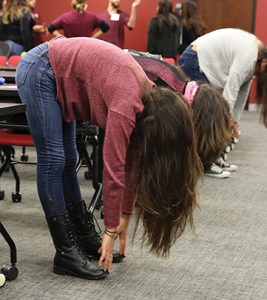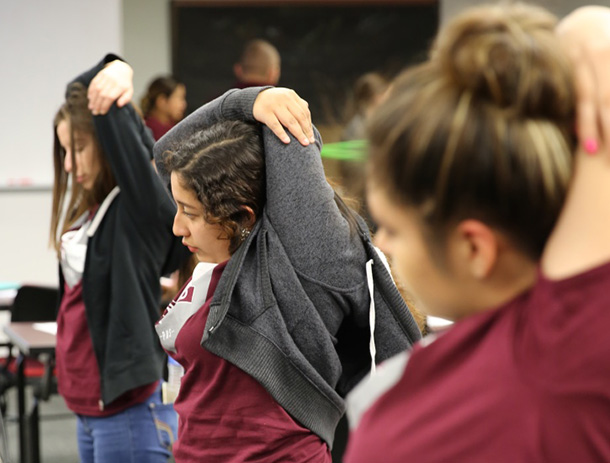Once a month, up to 60 local high school students join volunteers from the Primary Care Physician Assistant (PA) Program at Keck School of Medicine of USC for the Pipeline Program, which teaches these students knowledge and skills that could transform their future careers.
This program was one of the reasons cited by the Physician Assistant Education Association Forum for recognizing the Keck School’s program with the Excellence Through Diversity Award.
The Pipeline Program was established almost four years ago under the guidance of Maria G. Maldonado, MPH, MPAP, PA-C, faculty instructor of clinical medicine and pipeline recruitment director. The program is one of the ways the Keck School reaches out to the community, sparking interest in medical fields among a diverse base of qualified students.

Teenagers learn about a range of health care-related topics, including neurology, anatomy, and physical therapy. (Photo/Claire Norman)
Maldonado is quick to point out that she’s not the only influence on the program.
“It’s a team effort on every level, and that’s one of the things that really makes this program successful,” she said. “I really think that’s one of the strong foundational pieces for this to continue to be in action and to be sustainable.”
The teenagers who participate in the program are almost all from underserved schools in the area and are considering careers in a variety of medical positions. Topics at these events range from neurology, anatomy and physiology to nutrition and basic first aid, and the students are introduced to a wide range of health care careers.
The enthusiasm for the program and the subject matter is clear when Mariah Ginez, a 17-year-old senior from Montebello High School, shares her experiences.
“I love this program,” she said with a smile. “I never knew about PAs before I came and now it’s pretty much the career path I am going to take.”
Maldonado’s vision for the future includes expanding the program to include parental support workshops, information about financial aid options and academic support once the students make it to graduate school.
“There are unique barriers and challenges that extend beyond the high school and college years to graduate school,” Maldonado said. “So that’s where we need to help any student who may be in academic risk.”
— Amanda Busick


